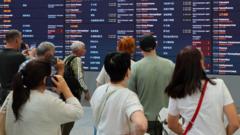Moscow's major airports have been temporarily closed following a series of Ukrainian drone assaults that resulted in the cancellation of at least 140 flights. The Russian defense ministry reported that more than 230 Ukrainian drones were intercepted across the country since Saturday morning, with 27 shot down over the capital itself. In response to these developments, Russia's aviation authority indicated that the major airports were disrupted multiple times, including at least 10 instances within a 24-hour span, forcing the redirection of over 130 flights. Operations have resumed, but the situation remains volatile.
In Ukraine, Russian air strikes claimed the lives of three individuals in separate incidents overnight, according to regional officials. Moscow's air defense systems successfully intercepted 45 drones during the same time frame, causing temporary closures at Kaluga International Airport to ensure safety for travelers. Russian military reports noted drone interceptions across various regions close to the Ukrainian border, including key areas like Rostov, Bryansk, and the Black Sea, with no casualties reported from these operations.
The frequency of disruptions from Ukrainian drones at Russian airports is not new. In May, a significant drone offensive left around 60,000 travelers stranded as over 500 drones were launched in a single day. Concurrently, Ukraine faced severe airstrikes, particularly in Donetsk, where two fatalities were reported alongside damage to residential areas in Sumy. Ukraine’s air force claimed to have downed 18 out of 57 Russian drones during the same period.
Amidst the conflict, Kremlin spokesperson Dmitry Peskov indicated President Vladimir Putin's willingness to seek a peaceful resolution to the ongoing war. Peskov reiterated Putin's commitment to achieving a diplomatic resolution, describing the process as challenging yet necessary. In line with diplomatic engagements, Ukrainian President Volodymyr Zelensky recently called for renewed talks with Moscow, emphasizing the need for high-level meetings to ensure peace.
The situation was further complicated by U.S. President Donald Trump’s announcement of advanced military aid for Ukraine, coupled with a warning of severe tariffs against Russia if the conflict does not see a resolution within a specified timeframe. Trump expressed disappointment with Putin, while also signaling that negotiations are far from over. In response, Peskov acknowledged Trump's direct comments but emphasized Russia's focus on attaining a peaceful settlement.
In Ukraine, Russian air strikes claimed the lives of three individuals in separate incidents overnight, according to regional officials. Moscow's air defense systems successfully intercepted 45 drones during the same time frame, causing temporary closures at Kaluga International Airport to ensure safety for travelers. Russian military reports noted drone interceptions across various regions close to the Ukrainian border, including key areas like Rostov, Bryansk, and the Black Sea, with no casualties reported from these operations.
The frequency of disruptions from Ukrainian drones at Russian airports is not new. In May, a significant drone offensive left around 60,000 travelers stranded as over 500 drones were launched in a single day. Concurrently, Ukraine faced severe airstrikes, particularly in Donetsk, where two fatalities were reported alongside damage to residential areas in Sumy. Ukraine’s air force claimed to have downed 18 out of 57 Russian drones during the same period.
Amidst the conflict, Kremlin spokesperson Dmitry Peskov indicated President Vladimir Putin's willingness to seek a peaceful resolution to the ongoing war. Peskov reiterated Putin's commitment to achieving a diplomatic resolution, describing the process as challenging yet necessary. In line with diplomatic engagements, Ukrainian President Volodymyr Zelensky recently called for renewed talks with Moscow, emphasizing the need for high-level meetings to ensure peace.
The situation was further complicated by U.S. President Donald Trump’s announcement of advanced military aid for Ukraine, coupled with a warning of severe tariffs against Russia if the conflict does not see a resolution within a specified timeframe. Trump expressed disappointment with Putin, while also signaling that negotiations are far from over. In response, Peskov acknowledged Trump's direct comments but emphasized Russia's focus on attaining a peaceful settlement.




















